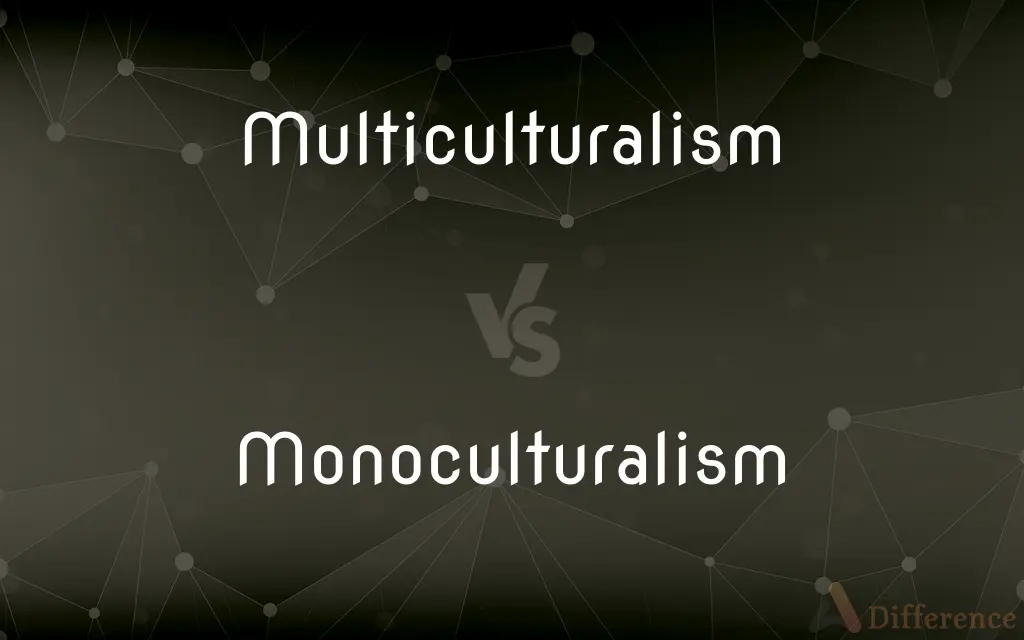Multiculturalism vs. Monoculturalism — What's the Difference?
Edited by Tayyaba Rehman — By Urooj Arif — Updated on March 6, 2024
Multiculturalism embraces cultural diversity and integration, fostering inclusiveness. Monoculturalism, on the other hand, promotes a single dominant culture, often resisting cultural mixing.

Difference Between Multiculturalism and Monoculturalism
Table of Contents
ADVERTISEMENT
Key Differences
Multiculturalism advocates for the acknowledgment and integration of diverse cultural backgrounds within a society, aiming to create a more inclusive and tolerant community. Whereas, monoculturalism emphasizes the importance of a single, dominant culture, suggesting that societal harmony is best achieved when cultural differences are minimized or assimilated.
In a multicultural society, policies and practices encourage the preservation of different cultural identities and promote equal respect for all traditions. On the other hand, a monocultural approach often leads to the marginalization of minority cultures in favor of a singular, often dominant cultural narrative.
Multiculturalism often leads to a rich tapestry of cultural expressions, including languages, religions, and traditions coexisting within the same community. This diversity is seen as a strength that can foster creativity and innovation. Monoculturalism, by contrast, can lead to a more homogeneous society where cultural expressions outside the dominant culture are less visible or valued.
While multiculturalism seeks to provide equal opportunities for all cultural groups, ensuring their representation in public life and institutions, monoculturalism tends to prioritize the traditions, values, and norms of the dominant culture, sometimes at the expense of cultural diversity.
Multicultural societies often implement educational curricula that include the histories and contributions of various cultural groups, promoting understanding and empathy among diverse populations. In contrast, monocultural educational systems may focus primarily on the history and achievements of the dominant culture, potentially neglecting the perspectives and contributions of other groups.
ADVERTISEMENT
Comparison Chart
Definition
Advocates for integrating and respecting diverse cultural identities within a society.
Promotes a single dominant culture, often minimizing or assimilating differences.
Cultural Diversity
Encourages the preservation and expression of diverse cultures.
Prefers a homogeneous cultural landscape, often sidelining minority cultures.
Social Policy
Implements inclusive policies that protect and promote cultural diversity.
May enforce policies that favor the dominant culture, limiting cultural expressions.
Educational Approach
Incorporates a diverse range of cultural histories and perspectives into curricula.
Tends to focus on the history and values of the dominant culture, possibly overlooking minority contributions.
Societal Impact
Fosters a rich, diverse cultural environment that can lead to innovation and creativity.
Can lead to a more uniform society with less visible cultural diversity and potential marginalization of minority groups.
Compare with Definitions
Multiculturalism
The coexistence of multiple cultural traditions in a single community.
New York City's multicultural environment is evident in its wide range of ethnic neighborhoods.
Monoculturalism
The minimization or assimilation of cultural differences in favor of a dominant culture.
Monocultural policies may discourage bilingual education in schools.
Multiculturalism
A framework for integrating immigrants and their cultural backgrounds into society.
Multiculturalism in Australia includes policies that support language preservation for immigrants.
Monoculturalism
A belief in or the practice of promoting a single dominant culture.
Monoculturalism often manifests in national language policies favoring one language.
Multiculturalism
A societal approach that recognizes and appreciates cultural diversity.
Canada's multicultural policy promotes the preservation of various cultural heritages.
Monoculturalism
A political stance advocating for the homogeneity of cultural expression.
Monoculturalism may resist changes that threaten the dominant cultural narrative.
Multiculturalism
A political ideology that values cultural diversity and inclusivity.
Multiculturalism challenges the notion of a monocultural national identity.
Monoculturalism
A societal norm that marginalizes minority cultures.
Monoculturalism can lead to the exclusion of immigrant traditions from public celebrations.
Multiculturalism
An educational principle that includes diverse cultural perspectives.
Multicultural education encourages the study of different cultural histories.
Monoculturalism
An educational approach focusing on a singular cultural perspective.
A monocultural curriculum might overlook the contributions of indigenous peoples.
Multiculturalism
The term multiculturalism has a range of meanings within the contexts of sociology, political philosophy, and colloquial use. In sociology and in everyday usage, it is a synonym for "ethnic pluralism", with the two terms often used interchangeably, and for cultural pluralism in which various ethnic groups collaborate and enter into a dialogue with one another without having to sacrifice their particular identities.
Monoculturalism
Monoculturalism is the policy or process of supporting, advocating, or allowing the expression of the culture of a single social or ethnic group. It generally stems from beliefs within the dominant group that their cultural practices are superior to those of minority groups and is similar to the concept of ethnocentrism which involves judging another culture, based on the values and standards of one's own culture.
Multiculturalism
Of, relating to, or including several cultures.
Monoculturalism
The cultivation of a single crop on a farm or in a region or country.
Multiculturalism
Of or relating to a social or educational theory that encourages interest in many cultures within a society rather than in only a mainstream culture.
Monoculturalism
A single, homogeneous culture without diversity or dissension.
Multiculturalism
The characteristics of a society, city etc. which has many different ethnic or national cultures mingling freely; political or social policies which support or encourage such coexistence.
Monoculturalism
The practice of maintaining, in a society, a single culture, suppressing the (sub)cultures of e.g. minority groups and excluding external influences.
Multiculturalism
The doctrine that several different cultures (rather than one national culture) can co-exist peacefully and equitably in a single country
Monoculturalism
The creation of a monoculture in agriculture.
Common Curiosities
What is multiculturalism?
Multiculturalism is a societal approach that values and seeks to integrate diverse cultural identities within a community, promoting inclusiveness and respect for all traditions.
What is monoculturalism?
Monoculturalism is the promotion or practice of a single dominant culture within a society, often at the expense of minimizing or assimilating cultural differences.
Does monoculturalism have any advantages?
Proponents argue that monoculturalism can lead to greater societal cohesion and a clearer national identity by minimizing cultural differences.
Can multiculturalism and monoculturalism coexist within the same society?
While theoretically possible, in practice, the dominance of monocultural policies can undermine the principles of multiculturalism by marginalizing minority cultures.
How does multiculturalism impact social policy?
Multiculturalism leads to the implementation of inclusive policies that protect cultural diversity and ensure equal respect for all cultural identities.
How do multiculturalism and monoculturalism differ in terms of educational approach?
Multicultural education includes diverse cultural perspectives and histories, whereas monocultural education often focuses solely on the dominant culture's perspectives.
What role does education play in promoting multiculturalism?
Education is crucial in promoting multiculturalism by incorporating diverse cultural perspectives into curricula, thus fostering understanding and empathy among students.
How does multiculturalism affect the workplace?
Multiculturalism in the workplace can enhance creativity, problem-solving, and innovation by incorporating diverse perspectives and approaches.
What challenges does multiculturalism face?
Challenges include potential cultural clashes, integration difficulties, and the risk of ghettoization or segregation of cultural groups.
What are the criticisms of monoculturalism?
Critics argue that monoculturalism can lead to social exclusion, discrimination, and the erosion of cultural diversity.
What are the benefits of multiculturalism?
Benefits include fostering a more inclusive, tolerant society, promoting creativity and innovation through diverse perspectives, and improving international relations.
Is multiculturalism the same in every country?
No, the implementation and interpretation of multiculturalism vary widely between countries, depending on their specific historical, social, and political contexts.
Why might some societies prefer monoculturalism?
Some societies may prefer monoculturalism to maintain a sense of tradition, unity, or national identity that they believe is threatened by cultural diversity.
How can societies transition from monoculturalism to multiculturalism?
Transitioning involves implementing inclusive policies, promoting cultural education, and encouraging dialogue and interaction among different cultural groups.
How do multicultural policies vary across countries?
Multicultural policies differ in terms of focus, ranging from integration and language preservation to the promotion of cultural expressions and protection of minority rights.
Share Your Discovery

Previous Comparison
Invasion vs. Colonization
Next Comparison
Melee vs. RiotAuthor Spotlight
Written by
Urooj ArifUrooj is a skilled content writer at Ask Difference, known for her exceptional ability to simplify complex topics into engaging and informative content. With a passion for research and a flair for clear, concise writing, she consistently delivers articles that resonate with our diverse audience.
Edited by
Tayyaba RehmanTayyaba Rehman is a distinguished writer, currently serving as a primary contributor to askdifference.com. As a researcher in semantics and etymology, Tayyaba's passion for the complexity of languages and their distinctions has found a perfect home on the platform. Tayyaba delves into the intricacies of language, distinguishing between commonly confused words and phrases, thereby providing clarity for readers worldwide.
















































